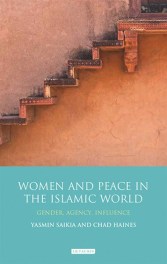Ariella Aïsha Azoulay, Potential History – Unlearning Imperialism (Verso, 2019).
Jadaliyya (J): What made you write this book?
Ariella Aïsha Azoulay (AAA): The lies. Not the lies being told by people, every once in a while, but what I call imperial lies, those that are materialized in institutions: archives, museums, states; captured by key political terms: citizenship, sovereignty, democracy; embedded in practices: preservation, collection, study; in qualities and dispositions: curiosity, connoisseurship, creativity; and even in what seems so basic as the tenses: i.e., past, present, and future. Unlike lies being told, which to a certain extent one can refute, with these imperial lies the situation is infinitely more complex since they are materialized in realities. They become part of the shared world upon which even those who oppose their materialization and were present “as it happened” and could witness how they came into being, have no choice but to interact with them. After all, the world is made of them, and they are not just words.
Example? Think about the state of Israel. The majority of the Arab inhabitants of Palestine were expelled in 1948, and a lie that their homeland would belong from then on to others was declared, proclaimed, imposed, legalized, inculcated, narrated, repeated, and recognized. Newborns were baptized as its citizens—“Israelis”—and grew up without knowing about the world that had been destroyed, and those who were evacuated were forced to assume a new status determined by categories which were themselves lies—“refugees,” “infiltrators,” “stateless”—but had already become part of the international legal system. Most of them were confined for several decades in refugee camps and put under military rule, in ways which only helped the consolidation of those realities. It is not about one or ten lies; it is about a new world that was created in the place of the one that was destroyed.
Potential history is an attempt to revise and reconfigure the key political terms in order to liberate history from its confinement to a past, which has been separated from the present. It is an attempt to narrate history as belonging, in a variety of ways, to a continuous present. Potential history refuses to take imperial sovereignty or the institution of the museum as a fait accompli and tries to highlight the ongoing struggles with which they are entangled, against non-imperial and worldly formations of political organization and making art. In other words, potential history is an intervention in the prevalent and hegemonic discourses of history and political theory, art and human rights, whose point of departure is a refusal to recognize the realities imperialism manufactures as irreversible, even when they are seventy or 300 years old. In place of imperial sovereignty, I propose in the book the category of worldly sovereignty and, instead of relating to art making as objects based, I reconstruct it as constitutive of people’s rights and mode of being in the world. Thus a potential history of a worldly sovereignty in Palestine which existed prior to its destruction in 1948, implied in the ongoing struggles against the institutions of imperial sovereignty (Israel, in this case), enables us to approach phenomena like the March of Return not merely as an act of protest against the conditions of the concentration camp that Gaza is, but as an attempt to reverse imperial history.
J: How does this book connect to and/or depart from your previous work?
AAA: Though Palestine—and the return—plays an important role in my new book, it is not a book about Palestine. The same is true for photography—it plays an important role but is not the subject of the book. The book is an attempt to provide a potential history of 500 years in which Palestine, but also photography and modern art, are late reiterations of imperialism’s major enterprise—the impairment of worlds and their replacement with standardized political structures that facilitate the implementation of disastrous political regimes. Imperial democracy, a regime that is predicated on differential body politic, is the model. In the book I am particularly interested in how this has been achieved through liberal formations of knowledge associated with museums, art, and human rights.
J: What particular topics, issues, and literatures does the book address?
AAA: When I migrated to the United States about seven years ago, I felt that I needed to delve into the political infrastructures of this place, “America.” This felt urgent, since there is almost nothing that one thinks or does here that do not partake in the reproduction of the robbery of lands and expropriation of the indigenous population on the one hand, and, on the other hand, in the ongoing project, embedded in a variety of institutions and practices, of the radical racialization of American life. This is how slavery and its afterlives became a constitutive element in my work and essential to the book’s reconfiguration of a cluster of key political terms. The book contends that the notion of the past is an imperial invention, so obviously the idea was not to become an historian of slavery or imperialism, but rather to offer their potential history through the category of reparations. The affinities that I observed between the denial of reparations and restitution here, and the denial of return in the context of Palestine, became central to the book. What may seem unrelated cases cease to be that once you approach them through the materiality of a shared world and the perspectives of world-making and world-destroying practices. This has enabled me to reconfigure rights outside of the eighteenth-century tradition that culminated in the UN 1945 declaration, and to offer a non-imperial conception of rights embedded in shared worlds. I sought to imagine, reconstruct, and conceptualize rights out of the way people claim them, rather than out of written declarations, philosophical treatises, or the existing histories and theories of human rights. All these, I have tried to show, share some problematic assumptions about rights and freedom, in so far as they were conceived in imperial contexts, by actors who took part or tacitly collaborated in the systematic destructions of the worlds of others. The Palestinian man captured in a photograph as he is resisting deportation—not the protocols in which the “right of return” is claimed or denied— became my companion, or “text book” for studying rights. Alongside this photograph and that man, there were different authors, such as DuBois and his notion of the general strike, Saidiya Hartman and her “critical fabulation”, Ghassan Kanafani and his notion of return, Sylvia Wynter and her discussion of 1492, or Houria Boutledja and her elaboration on the “indigenous of the republic.”
J: Who do you hope will read this book, and what sort of impact would you like it to have?
AAA: Potential history was the anti-imperial proposition for which I was searching a long time before I found myself writing it. Inspired by so many great books that offer counter histories while shaking the ground on which history—the discipline and the genre of research and writing—is premised, this book is an attempt to re-configure this shaken ground and argue that what these authors are doing is not “counter history”, which would be an affirmation of history, but rather a “counter to history”. Assuming that history is an offense against people’s aspirations to protect the world destroyed by racial capitalism and imperialism, counter to history is a provocation that states: all that which has been achieved through violence is not history, i.e., not over, does not belong to the past. I wish that anyone who is interested in imagining a possible life outside of racial capitalism and imperialism would take this book in her hands and will work with it to continue this kind of work.
J: What other projects are you working on now?
AAA: I am working on a new film that focuses on looted objects displayed or stored in European and American museums. My idea is to present these objects as the “missing documents” of allegedly “undocumented” migrants, i.e., people whose movement has been blocked and their life endangered for not having the right documents. It is going to be a kind of potential history of these looted objects that problematizes and seeks to transcend the status conferred on them as art objects. Instead I am trying to foreground the attachment of these objects to the people from whom they were expropriated and claim that the rights of these people are inscribed in these objects. Holding unrightfully these objects, rather than persecuting people and treating them as “undocumented”, their right to live in the vicinity of their objects should be advocated and recognized.
J: If the past is an imperial invention – should we engage with the future?
AAA: No, not at all. The “past” is assumed existing through institutions and mechanisms that are made to secure the irreversibility of imperial formations of violence under the assumption that the past cannot be changed. This is not true. We ought to change what was relegated to “the past” and declared as over, while it is actually viciously destroying fabrics of life here and now. The past is the guarantor of imperial actors’ interests. By undoing imperial structures in the present, different ways are being opened by themselves. The abolition of the imperial rights of the few is key for the recovery of worldly life with others.
Excerpt from the book
Aïsha
More than a decade ago, when I started the research for this book, I could not anticipate that the nothingness that I know about the Algerian origin of my father would one day have a proper name. Some years ago, already deep into the writing of this book, I came to know this proper name—Aïsha—and adopted it, making it mine. This was the name of my father’s mother, my grandmother, which he never passed down to us, his daughters and grandchildren. His mother’s name at home was always “grandma,” which as a child seemed to me a proper name. I discovered Aïsha as my grandmother’s name only after my father’s death, when I looked at his birth certificate. I was all too familiar with my father’s overt and covert practices of passing for a French. When I first interpreted his action in relation to us, his children and grandchildren, I ignored the meaning of his action in relation to his ancestors. It took me some time before I could recognize that it was more than just a name, that my grandmother insisted and my father gave up on adherence to a name that the whole family was encouraged not to carry when they had been invited to become French citizens, in other words, to give away part of their Arabness. By concealing this name from us, my father betrayed his ancestors. He acted like the male-patriotic Roman citizens in David’s painting, The Oath of the Oratii (in which French revolutionaries would recognize themselves shortly after the 1784 painting was completed), turning his back to the family and siding with the patriotic colonizers who were busy destroying the family’s precolonial world, a world that my grandmother’s name still evokes.
By not letting the name go—by rejecting my father’s legacy for the sake of renewing the precolonial legacy of the family—I am standing with my ancestors and not against them, trying to reverse my father’s readiness, once and again, to replace the wound of the colonized by converting into a “colonial monger” who turns against himself, his family, and his world. Even though his citizenship was revoked in 1941 and he was incarcerated in one of Vichy’s concentration camps, he still desired to be “one of them.” I wished he had revolted against the breach in his existence forced by the colonizers that impaired his capacity to cherish and care for the world into which he was born, making him incapable of saying aloud his mother’s name and sharing it with his children. But I knew he could not do that. This would have required accepting his identity as an Algerian, the kind of man the colonizers despised, and an Arab Jew, the kind of existence and historical experience that the Zionists in his new “homeland” consistently denied. I do regret that I never had a name for his particular French accent and could never ask him about its origin. For, obviously, what I now recognize as a North African accent could not have been acquired without speaking—at least as a child and with his mother—Arabic.
My father clearly did not want this name to circulate and be associated with our family, to taint the semi-white appearance he worked hard to acquire. He was a clever and creative man who used inventive skills to survive the racialization of non-European Jews who immigrated to Palestine soon after the destruction of Palestine and the establishment of the state of Israel. Arriving to Israel in 1949 from Paris, he did not miss the opportunity to pass for a French immigrant, rather than the dark-skinned Algerian Jew that he was. His “passing scheme” included us, his children, whom he had sought to whiten even before we were born, when he courted a light-skinned woman as our future mother.
But dealing with his mother’s name was different. He could not have played with or around this name. He must have hidden and denied it altogether. Aïsha, Aï-sha, Aïeeee-shaaaa, an expression of a sharp pain that erupts with the first syllable (aïeee) and is immediately silenced by the second one (“sha,” a common sound of hushing), as if to appease what could get out of control. He had succeeded in it as long as he lived, but the secret was revealed soon after his death. I have experienced this discovery—the epiphany of an Arab name in the midst of a Jewish-Israeli and Hebrew speaking family—as a treasure. I have celebrated the presence of this unruly name as an invaluable relic from a different pre-imperial world, which has inspired this book from the moment I discovered it. With it my anti-imperial commitment became one with a pre-imperial aspiration to that which existed prior to the moment when thousands of Algerian Jews were invited or forced to understand their Jewishness as irreconcilable with their Arab and Algerian existence and had to alienate themselves from the world they once shared with their Muslim neighbors.
Embracing Aïsha as my name is an attempt to hold on to the potential preserved in it, a potential that survived a long history, from before the Crémieux decree (1872) to the present form of Zionism and the Israeli state. It is an attempt to reverse the command to posit one’s Jewish identity in absolute opposition to one’s Arabness. For, after all, the Crémieux decree was a French imperial act, which did not simply grant citizenship to one distinct group of non-Muslim Algerians (as it is often described) but started the work, which the Zionists later sought to complete, to make Algerian Jews into such a group of non-Arab, semi-European, and second-grade French citizens. The decree was world-destroying, setting some groups apart from the general colonized population and against constitutive elements of their own identity. From my Aïsha’s eyes, the imperial destruction of the commons in Palestine was exercised in a similar manner: a reiteration of a similar enterprise pursued a few decades earlier, westward along the southern Mediterranean shore.











